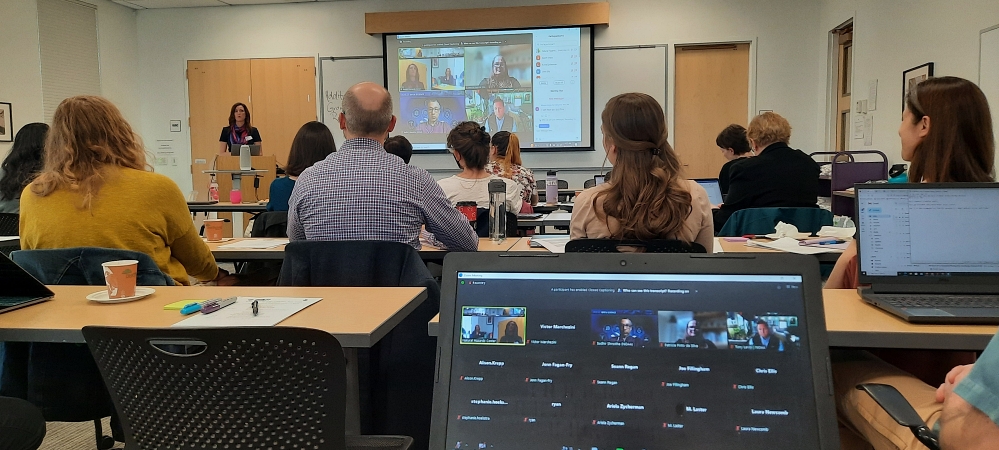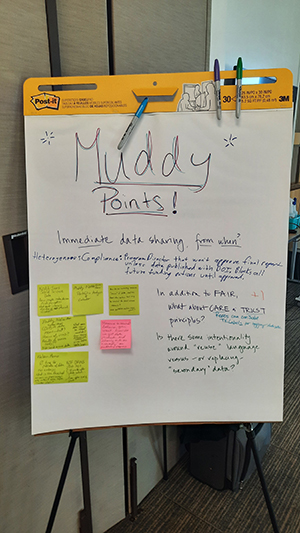 Natural Hazards Center Director Lori Peek explains discussion protocols at the Open Data Workshop held in Boulder, Colorado. ©Natural Hazards Center/Victor Marchezini, 2023.
Natural Hazards Center Director Lori Peek explains discussion protocols at the Open Data Workshop held in Boulder, Colorado. ©Natural Hazards Center/Victor Marchezini, 2023.
Guidance from the White House has mandated that researchers who receive federal funds must make their publications and data publicly available at no cost and without delay.
The guidance, first issued in a 2022 memo by the White House Office of Science and Technology Policy (OSTP), builds on previous efforts to advance open science. In particular, the memo prioritizes equitable and timely access to research data and findings for all members of the public.
The directive has the potential to positively influence research outputs and maintain the public’s trust in science, but it could also create additional burdens for researchers, data repositories, and federal funders. A recent report from CU Boulder’s Natural Hazards Center and the National Oceanic and Atmospheric Administration (NOAA) Weather Program Office provides direction on potential paths forward.
In April 2023, the center convened a workshop where social scientists, federal funders, data librarians, and other experts produced community-informed recommendations on the publication and reuse of social science data in weather-related research.
“The workshop brought together many groups that will be affected by this important new policy guidance,” said Natural Hazards Center Director Lori Peek. “The participants raised provocative questions about how this will affect the research enterprise, and they offered actionable recommendations to help support the research community.”
The findings of the workshop are now available in the Final Report of the Workshop on Open Data and Reuse in Social Science Weather Research. It offers a synopsis of key observations as well as recommended actions to ease the transition to the new policy. While the workshop and findings were intended for social science research, they apply to other disciplines as well.
 A brainstorming exercise held at the workshop. ©Natural Hazards Center/Jennifer Tobin, 2023.
A brainstorming exercise held at the workshop. ©Natural Hazards Center/Jennifer Tobin, 2023.
Overall, the report found that careful planning, communication, and new collaborations are needed to help advance goals for achieving more open science while lessening the impacts to researchers and data librarians. Participants identified a number of gray areas in the brief guidance memo issued by OSTP. The report outlines areas that need further clarification, as well as those that could hinder research rigor. The robust cyberinfrastructure needed to support data publication and reuse was also discussed.
Workshop participants noted that an understanding of the policy changes varied widely among those impacted and that key terms used in the guidance—including “free,” “timely,” and “data”—needed better explanation. They were also concerned that stringent data publication requirements could hamper the collection of sensitive data and create barriers, especially for early career professionals, qualitative researchers, and those located at historically underfunded institutions.
At the same time, those at the workshop were heartened by the opportunities the guidance provides to address systemic inequities, create ethical principles for open data, and advance interdisciplinary and data integration and reuse.
“NOAA is a major funder of both physical and social science weather research,” said Gina Eosco, Science, Technology, and Society Division Chief in NOAA’s Weather Program Office. “This workshop really helped us to better understand community concerns and also the collaborative actions we can take to best respond to this guidance.”
The report dives into issues that are especially important to social science weather researchers because of their work with human subjects, suggesting that models for ethically publishing sensitive data need to be developed and best practices for protecting participants’ privacy should be established.
The act of publishing data was also examined. While there are thousands of data repositories in existence, most aren’t certified. Workshop participants pointed out that a failure to identify which repositories are preferred could result in data being housed on less-than-robust platforms, while also making it harder to find and therefore hindering reuse.
Workshop planners said they hope that others will use the workshop template to drive discussion as they continue to determine what the guidance means for them.
“We are so impressed that the social science research community and their partners convened this workshop,” said NOAA’s Chief Data Officer, Tony LaVoi. “We are taking these findings and recommendations seriously as we move forward with implementing the most recent policy guidance. We look forward to sharing the report with other federal agencies as well.”
NOAA and CU researchers will hold a listening session and a panel discussion about this report and the associated workshop at the Annual Meeting of the American Meteorological Society (AMS) in Baltimore, Maryland on Monday, January 29, 2024.